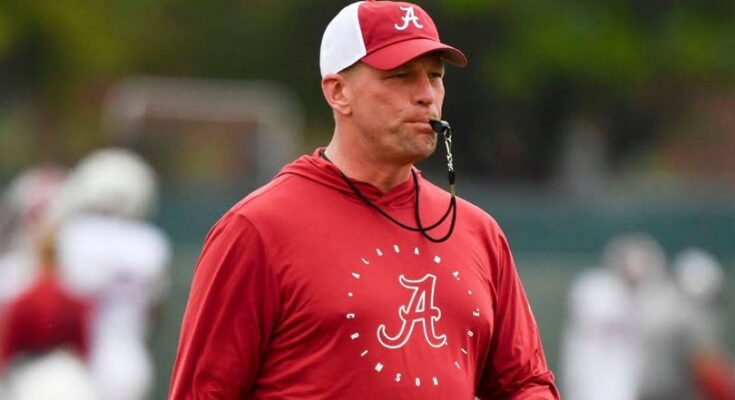The popular narrative surrounding Kalen DeBoer, the new head coach of the Alabama Crimson Tide, often paints a picture of a calm, collected, and relentlessly positive leader. His soft-spoken demeanor, strategic mind, and consistent upward trajectory as a head coach have largely defined his public image. Many fans and commentators, particularly those accustomed to the fiery intensity of his predecessor, Nick Saban, might perceive DeBoer as perpetually even-keeled. But as any seasoned observer of high-stakes sports knows, outward calm can often mask an inner ferocity. As the saying goes, “Don’t be a fool.” Those who believe Kalen DeBoer is incapable of flipping that switch and becoming irate are gravely mistaken.
To truly understand the competitive fire that burns within DeBoer, one must look beyond the press conference smiles and the measured responses. His coaching journey, from NAIA dominance to FBS breakthroughs at Fresno State, Washington, and now Alabama, is not merely a tale of strategic brilliance but also of fierce determination and an unwavering demand for excellence. You don’t achieve the level of success DeBoer has without an intense emotional investment in the outcome, and sometimes, that investment manifests as visible anger.
Consider his roots. DeBoer honed his craft in environments where passion and intensity are paramount. At Sioux Falls, where he built a veritable NAIA dynasty, every game was a battle, and every player’s effort mattered. In those trenches, coaches must instill a profound sense of urgency and accountability. While he might not have thrown headsets or screamed incessantly, there’s a certainty that moments of pointed, unvarnished ire were necessary to forge championship teams. Developing young men, especially in a competitive environment, requires a full spectrum of emotional responses, including the occasional outburst when standards are not met.
The perception of DeBoer’s perpetual calm might stem from his strategic approach to communication. Unlike some coaches who use anger as a primary motivational tool, DeBoer is known for his analytical mind. He likely reserves his moments of irate expression for when they are most impactful, rather than resorting to them as a default. This calculated application of anger makes it all the more potent when it does surface. When a normally composed individual becomes visibly angry, it sends a far stronger message than from someone who is frequently agitated. It signals that a line has been crossed, a standard has been severely missed, or a level of unacceptable performance has been reached.
There are anecdotal accounts from former players and assistant coaches, though not widely publicized, that confirm this side of DeBoer. They speak of a coach who, when displeased, can deliver a scathing critique with precise, cutting words that leave no doubt about his dissatisfaction. His anger might not be a loud, theatrical explosion, but a quiet, simmering intensity that is equally, if not more, terrifying to those on the receiving end. This form of “irate” behavior, characterized by steely glares, sharp rebukes, and an unmistakable aura of disappointment, can be far more effective in eliciting a desired response than mere shouting. It implies a deeper level of disappointment, a betrayal of trust in the established process and standards.
Furthermore, any coach taking over a program like Alabama, especially in the shadow of a legend like Nick Saban, must possess an inherent toughness and a willingness to be assertive when necessary. The pressure at Alabama is immense, and maintaining the highest standards demands a leader who can hold players and staff accountable without wavering. While Saban’s fiery outbursts were legendary, DeBoer will undoubtedly have his own methods for conveying extreme displeasure. The transition from Saban’s overt intensity to DeBoer’s more measured approach is a key part of the new narrative, but it would be naive to assume the underlying competitive fire has diminished.
The very nature of coaching at the elite level demands a certain degree of “irate” capability. When a team underperforms, when a critical mistake is made due to lack of focus or effort, or when complacency sets in, a coach must be able to jolt his players back into line. Sometimes, that jolt is a calm, strategic adjustment. Other times, it requires a visceral display of anger to ignite a response. DeBoer, having navigated numerous locker rooms and high-pressure situations, understands this dynamic implicitly.
The “Don’t be a fool” warning is particularly relevant for those outside the inner circle. What the public sees is often a curated image. Inside the meeting rooms, on the practice field, and during crucial moments of a game, the raw emotions of coaching are far more likely to surface. Players who have played for DeBoer have described him as intense and demanding, even if he doesn’t fit the stereotypical mold of a “screaming” coach. His irate moments are likely calculated to maximize impact, targeting specific behaviors or lapses in effort rather than being random explosions.
For the Alabama players, especially those who grew up under Saban’s famously demanding style, they will undoubtedly learn quickly that DeBoer, despite his calm exterior, possesses a similar intolerance for mediocrity and a profound capacity for anger when his high standards are not met. They may not experience the same kind of public tirades, but they will certainly feel the heat when “the switch” flips.
In essence, Kalen DeBoer is a testament to the fact that intensity comes in many forms. While his public persona is one of composure and analytical prowess, the core of any successful high-level coach is an unwavering drive to win and an absolute intolerance for anything less than maximum effort and flawless execution. To think that this drive never manifests as frustration, disappointment, or outright anger would be a profound misjudgment. So, indeed, don’t be a fool. Kalen DeBoer is every bit as capable of flipping that switch and becoming irate as any other elite coach, and those who underestimate that aspect of his leadership do so at their own peril. His ire may be quieter, more pointed, but no less impactful than the loudest roar.



